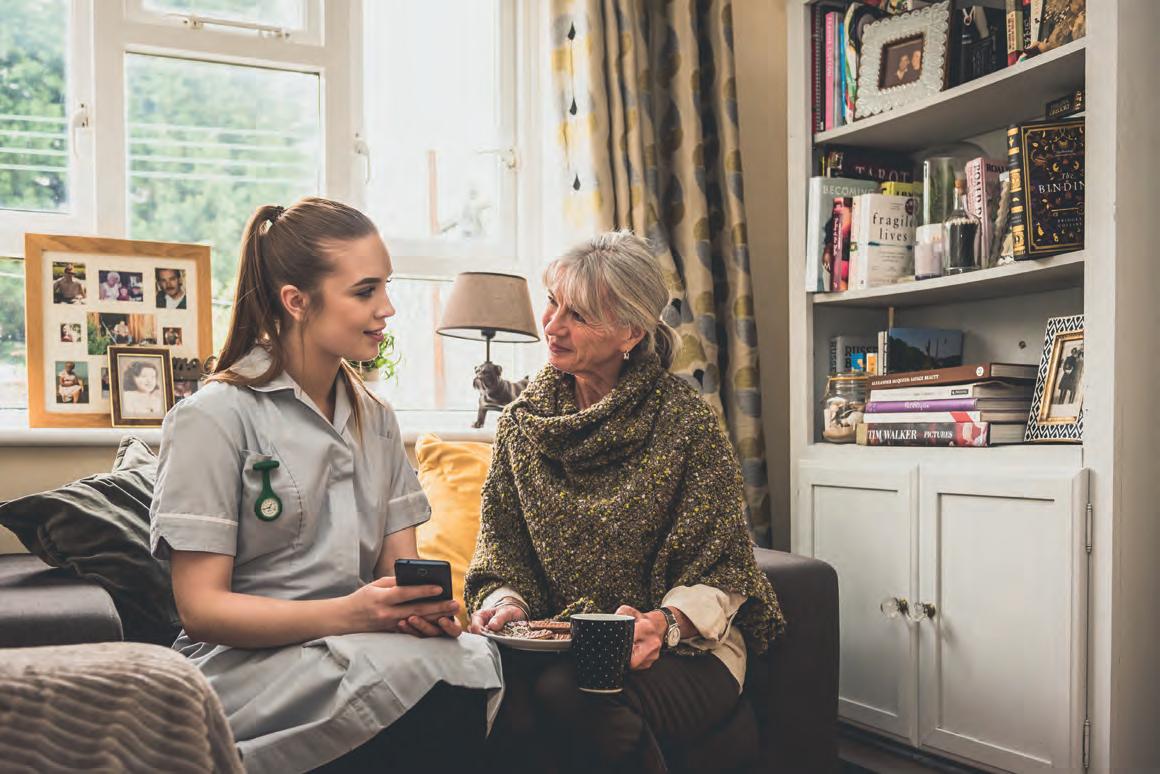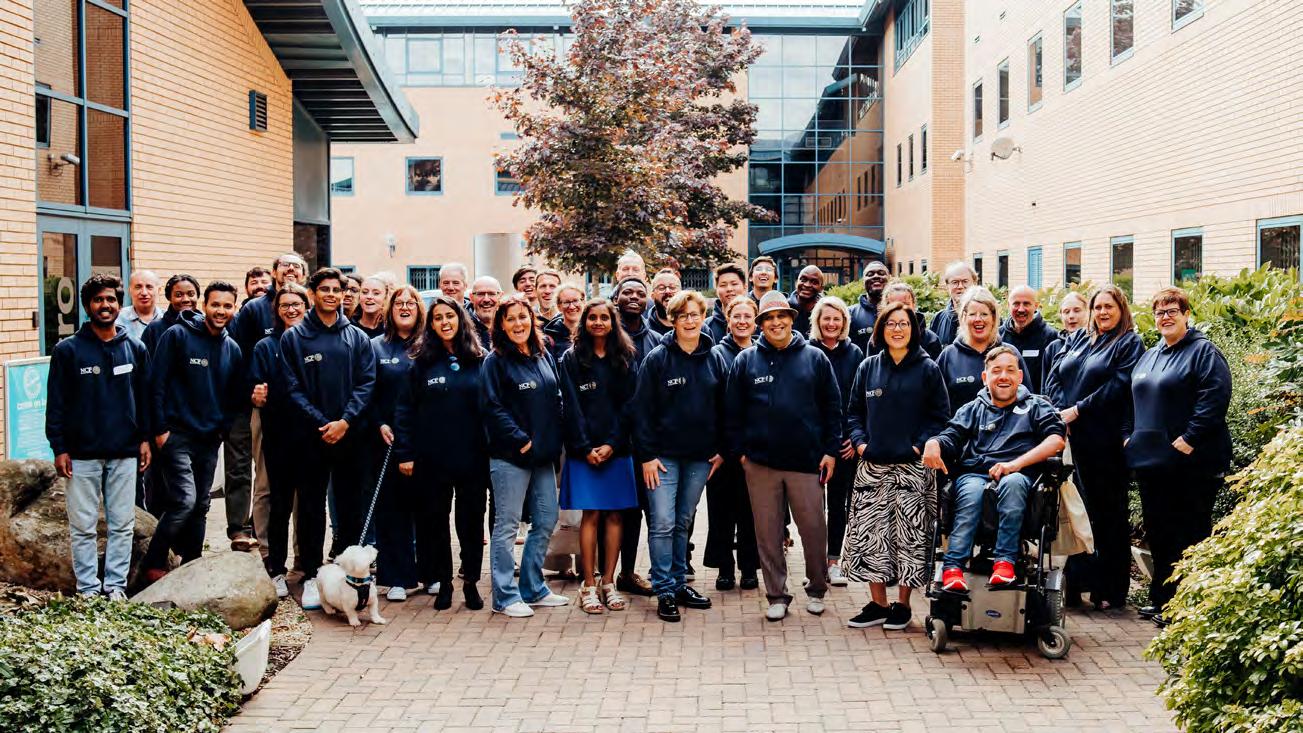MIND THE GAP

Campaigning for fair pay
Shifting patterns
Guaranteed hours contracts

Let’s talk menopause
How to support the workforce
A helping hand
Volunteering in the care sector




Campaigning for fair pay
Shifting patterns
Guaranteed hours contracts

Let’s talk menopause
How to support the workforce
A helping hand
Volunteering in the care sector


Social Care Insights
David Brindle shares his analysis on the Labour Party’s proposed National Care Service and explains why social care providers should keep an eye on an ever-changing Government.
Inside CQC
Mary Cridge, the Director of Adult Social Care at the Care Quality Commission (CQC), updates on the CQC’s response to winter pressures and shares ambitions for the year ahead.
CMM News Into Perspective
In this issue, our experts react to the Government hospital discharge fund plan and what it might mean for the social care sector.
Celebrating Excellence
We catch up with Intergenerational Music Making (IMM) founder, Charlotte Miller, to find out about IMM’s journey since winning the Campaigning for Change Award at the Markel 3rd Sector Care Awards.
Event Preview
CMM shares what to expect from Care England’s Annual Conference, ‘Thriving not just surviving’, which is taking place on 16th March.
What’s On?
Straight Talk
Daniel Carmel-Brown, Chief Executive of Jewish Care, explains how the care organisation works with families and residents to uphold the highest levels of dignity and respect in its care homes.
Mind the gap: Campaigning for fair pay

The social care sector has been calling for greater investment, fair pay and a clear workforce strategy for decades. Jim Kane, Chief Executive of Community Integrated Care, updates on the Unfair To Care campaign.
Shifting patterns: The importance of guaranteed hours contracts

Should providers be offering zero hours contracts to employees? Elisabeth Clark, Chief Executive of Avanti Homecare, explains the importance of guaranteed hours contracts for her workforce and business.
A helping hand: Why we need to harness public interest in volunteering
There are a number of reasons why people choose to volunteer in the social care sector. Dr Allison Smith, Head of Research and Insight at Royal Voluntary Service, shares findings from a recent report and how volunteers can support care settings.
The sky’s the limit: Realising the potential of an international workforce

Looking for solutions at home and abroad to hire people with the right skills and values is key. Suleman Sacranie, Founder of Care Hires, outlines international recruitment best practice and how to involve existing staff in the process.
Let’s talk menopause: How can employers champion menopause in the workforce?
It is vital that policies and culture keeps pace to ensure that everyone can have the support to thrive in their careers. Sarah Jones, Chief Executive of Anchor, shares how providers can foster an inclusive and supportive culture.
editor@caremanagementmatters.co.uk
Editor: Olivia Hubbard
Commissioning Editor: Angharad Burnham

Content Editors: Aislinn Thompson, Henry Thornton
Designer: Rebecca Mendil

Director of Creative Operations: Lisa Werthmann
Studio Manager: Jamie Harvey
sales@caremanagementmatters.co.uk
01223 207770
Advertising Manager: Aaron Barber aaron.barber@carechoices.co.uk

Director of Sales: David Werthmann david.werthmann@carechoices.co.uk



Sign up to receive the latest magazines and news for FREE. info@caremanagementmatters.co.uk
01223 207770
www.caremanagementmatters.co.uk
Care Management Matters is published by Care Choices Ltd who cannot be held responsible for views expressed by contributors. Care Management Matters © Care Choices Ltd 2023
CCL REF NO: CMM 20.1
@DavidJ_Brindle
David Brindle
Former Public Services Editor of The Guardian, Chair of Ambient Support

CMM magazine is officially part of the membership entitlement of:
@LGAcomms @AlanLewisCL
Alan Lewis Employment Partner, Constantine Law
Cllr David Baines Leader of St Helens Borough Council, Local Government Association
@HomecareAvanti @CQCProf
@ComIntCare
Jim
Chief Executive, Community Integrated Care
Elisabeth Clark Chief Executive, Avanti Homecare


@NationalCareAsc
Nadra Ahmed CBE

Executive Chairman, National Care Association

@RoyalVolService
Dr Allison Smith Head of Research and Insight at Royal Voluntary Service



The National Care Service proposal by the Labour party is still in draft form, but should providers watch developments closely? David Brindle shares his analysis.
Over 35 years of writing about social care I’ve seen shockingly bad services in the public, voluntary and for-profit sectors alike. Equally, I’ve seen outstanding quality in all three.
It rarely comes down to funding alone, though in theory it ought to be easier to provide first-class care at first-class prices. Leadership, training and values are more often the indicators of good or poor outcomes for the people who are supported.
Adult social care is a mixed economy and should surely stay so. But the Labour Party’s idea of a National Care Service (NCS) for England has prompted fears that independent providers would be squeezed out of a rigidly centralised system –
understandable fears because Labour has been vague about the detail and slow to offer any reassurance to the contrary.
We are now getting the first clues to what an NCS would look like. The Fabian Society thinktank has been tasked with drafting a ‘roadmap’ for getting from here to there and its emerging conclusions suggest there ought to be little to scare the horses.
Andrew Harrop, the Fabians’ General Secretary and a past policy director of Age UK and Age Concern England before it, told a recent National Care Forum conference that the NCS would in his expectation be ‘a partnership, a network, not a single institution’ – in other words, not a mirror image of
the NHS – and ‘as local and devolved as possible’.
Independent providers would have ‘a huge part to play’, Harrop said. ‘There won’t be a nationalisation, there won’t be a state takeover. There might be a role in some contexts for public organisations, but providers in the independent sector will still play a huge part in delivery.’

So far, so reassuring. But social care leaders need to pay much more attention to the development of Labour’s policy – and not just because polls suggest the party looks well on course to form the next Government.
First, the level of understanding of the care sector among Labour activists
is low. For-profit operation is equated falsely with private equity and offshore investors taking inflated profits, not the typical small provider with one or two care homes or a domiciliary care franchise.
Second, the Labour Government in Wales has been consulting on proposals to ‘eliminate profit-making’ in children’s residential and fostering provision. That has a simple and broader appeal to many in the party on both sides of Offa’s Dyke.
And third, Labour’s shadow Health and Social Care Secretary, Wes Streeting, has yet to show much interest in the non-NHS side of his brief. He is given to provocative interventions and could spring an unwelcome surprise when he does turn his attention to it, however carefully the Fabians roll the pitch and notwithstanding the keen grasp of issues held by his experienced deputy, Shadow Care Minister Liz Kendall.
It’s admittedly hard enough keeping the show on the road in social care. But events are moving fast and care leaders must lift their heads from the day-to-day struggle and seek purposefully to engage the party that, on most forecasts, seems likely to be in Downing Street by the end of next year. The stakes are high.


It’s a winter quite unlike any other and you’ve been working tirelessly to provide safe, high-quality care in the face of existing pressures. I’d like to start by sharing a sincere thank you to you and your teams across the country for all that you continue to do.
We’ll use this column, throughout the year, to shine a light on some of the fantastic care we’re seeing. Before Christmas, we were delighted to rate Leaf Complex Care Exeter as ‘outstanding’ overall. They provide care and support to people with a learning disability and autistic people who live in their own homes, so they can live as independently as possible. The service was truly exceptional – responsive to people’s needs and led by a committed team who went above and beyond to make sure people and their families received excellent care. I encourage you to read the report – there’s so much to learn on personalised quality of care, it’s wonderful.
We recently shared an update on how we’re responding to winter pressures.
Within adult social care we’ve listened to what we’ve heard from you, your trade associations and wider stakeholders around concerns that ratings of adult social care services are having an impact on the capacity of beds available for commissioning. As a
Mary Cridge, the Director of Adult Social Care at the Care Quality Commission (CQC), shines a light on an ‘exceptional’ care setting, updates on the CQC’s response to winter pressures, and shares the ambitions of the CQC’s leadership team for the year ahead.

result, we’re working with Directors of Adult Social Services across England to identify care homes or home care agencies we could inspect to assess whether ‘requires improvement’ ratings can be updated. We’ll also be inspecting services which are registered and active but not rated, if the lack of a rating is a barrier to people accessing those services. Full criteria can be found on our website.
So, how will it work? We’ll be looking at our own intelligence and monitoring outcomes alongside local authority information. The decision to inspect rests with CQC and we’ll be using our existing methodology, both focused and comprehensive. Inspections will be unannounced, although local authorities may be in touch beforehand. Our reporting will be as normal; however, once we’ve given the outcome to you, you’re welcome to let your local authority know so they can start to commission with you.
Our aim is to carry out 300 of these inspections by the end of March 2023. I am delighted to share that we’re currently prioritising over 350. We’ve had many discussions with you on revisiting ‘requires improvement’ ratings – this, I hope you agree, is a good start.
The Regulatory Leadership team has also been busily planning our ambitions for the year ahead. We shared our early thinking in a recent webinar where we were joined by over
3,000 providers. This month we welcomed our two new Deputy Directors for Adult Social Care, Alison Murray and Amanda Partington-Todd. Below they share their motivations and ambitions.
Alison Murray, a Registered Nurse with an NHS and social care background, said, ‘I actively chose to build my career in adult social care and haven’t regretted that for a minute. I’ve had the privilege of working with and supporting amazing people. I’m particularly keen to promote the role of the nurse in adult social care.
‘I’ve been involved in dementia care for the majority of my adult life. I’m excited about the opportunities our new regulatory powers and assessment frameworks bring to improve the experiences of people who are living with dementia across health and social care.’
Amanda Partington-Todd, a Registered Social Worker who has worked in the social care sector since the age of 16, said, ‘I’m a passionate advocate for adult social care and the difference it makes to people’s lives when we get it right.
‘I’m ambitious that Regulatory Leadership sets the example for collaborative crosssector working and use our independent voice to highlight best practice, innovation and what it feels like for people to be on the receiving end of truly high-quality, personcentred and co-produced care.’
You’ll hear more from Alison and Amanda in these columns over the coming year. In the meantime, read more about the wider Regulatory Leadership team in our recent blog.
An online family history tour for residents and their families.

Make new memories with YourTour. Guided online by our professional genealogists, YourTour is the perfect gift from a family member to your residents.

All you need is a computer, laptop or tablet to share and an hour to take a guided tour of your own family history.
Perfect to enjoy during a visit by a family member on special occasions like Birthdays or Mother’s Day.
Visit our website HERE
What are people saying about YourTour?


“Our Guide was terrific! My husband discovered a particularly swashbuckling ancestor who crewed on ‘cutters’ that chased whisky smugglers at sea. Probably muskets and cutlasses involved! Our Guide had obviously done a great deal of work on the tour and we were all engrossed in the revelations.”
RM, London
Watch our demo HERE
Contact admin@historicproductions.co.uk to learn more
(c) Historic Productions Ltd Company No 11856978, VAT Reg 337930092
A coalition of over 50 organisations is calling on the Government to protect in law the support of family carers across health and care settings.
A broad spectrum of organisations has come together to say ‘never again’ should people in vulnerable situations be separated from the support of their carers –partners, parents, children, siblings or friends. The organisations represent millions of people relying on health and care services across the country. The joint call also has cross-party support
and, in October, the Care Minister told Parliament, ‘I do not consider the status quo acceptable, and I am on the case.’
The organisations leading the call were deeply disappointed by the Secretary of State’s comment last week that he is resistant to setting any ‘national diktats’, despite evidence that some hospitals are ignoring clear directives from NHS England Chief Executive Amanda Pritchard and Chief Nursing Officer Ruth May that carers and visitors should once again be
welcomed. The Relatives & Residents Association, Rights For Residents and John’s Campaign have written to the Chair of the Health and Social Care Select Committee, Steve Brine MP, requesting that he clarifies the Government’s position. Julia Jones, Co-Founder of John’s Campaign, said, ‘This is a chance for the Department of Health and Social Care to get its act together and legislate decisively on behalf of the people for whom it exists – patients, residents and service users – you and me.’
Over 60 MPs wrote to the (then) Secretary of State in May last year supporting the call and a cross-party group of MPs is working to take this forward: Liberal Democrat Deputy Leader Daisy Cooper, Conservative MP Tracey Crouch, Labour MP Dan Carden and Plaid Cymru Westminster Leader Liz Saville Roberts. The new right would give anyone who needs care access to a ‘Care Supporter’ – a relative or friend who can help them wherever they need it, such as in hospitals, care homes or GP surgeries.
The Association for Real Change (ARC England) Learning Disability Research Unit today launches its Local Authority Fee Rate Map, which shows that in many cases fee rates do not cover the cost of care.
Over 80% of local authorities provided their fee rate data in response to ARC's Freedom of Information request and the map shows a wide variation in fee rates between areas in England and Wales. It can be seen that, in many local authorities, fee rates have fallen behind provider costs and that annual uplifts have not kept pace with inflationary pressures.
In order to pay the Real Living Wage of £10.90 (£11.95 in London),
supported living and domiciliary care providers need to receive a fee rate of £22.69. The data obtained shows that:
• 76 out of 78 local authorities who responded (97%) paid less than £22.69 per hour to supported living services.
• 104 out of 114 responding local authorities (91%) paid less than £22.69 per hour to domiciliary care providers.
• Inflation and costof-living pressures have combined with the requirement that providers meet annual National Minimum Wage (NMW) or National Living Wage increases to mean some services
are now financially unsustainable. ARC is concerned that this could lead to people with a learning disability and autistic people no longer being supported to live well within their communities.
• In supported living services, where staff wage payments represent approximately 85% of providers' costs, the 2019-20 NMW increase by 5% to £8.21 resulted in a rise in operating costs of 4.13%.
• By 2022-23 the NMW increase to £9.50 resulted in an operating cost rise of 8.23%, this in a sector already hit by severe recruitment and
Athena
Athena Care Homes has welcomed Project Manager Richard Shaw to the business. Richard joined Athena in January and will lead the estates team as the business looks to continue its growth.
iVolve
iVolve (formerly Envivo) has officially launched its new larger family of social care providers in addition to the acquisition of learning disability care provider, Cavendish Care. Tim Davies will serve as ivolve’s Group Chief Executive Officer.
Grove Care Home Grove Care Home in Kemnay, Aberdeenshire, has announced the appointment of new care home manager, William Narvaez.
Independent Care Group
retention problems, due in part to low pay and competition from rival sectors like retail and hospitality, which can afford to pay higher wages.
ARC’s Fee Rate Interactive Map has been designed to be a tool for collaboration between commissioners and providers in forthcoming conversations about fee rates and inflationary uplifts for 2023-24. ARC England would therefore like to invite all local authorities to use the interactive map as a benchmarking tool when setting fee rates and uplifts with providers. Visit the CMM website version of this article to view the Local Authority Fee Rate Interactive Map.
John Pattinson has been announced as the new Chief Executive of the Independent Care Group (ICG) with immediate effect. Since December 2021, John has been the ICG’s Operations Director and prior to that spent many years with the NHS.
Signature
Michelle Gray has been appointed as Care Home Manager and brings an extensive background of more than 30 years’ experience in social care and nursing, having worked in the private sector and the NHS, in both clinical and management roles.
Parklands Care Home in Alloa, Aberdeenshire, part of the Meallmore Ltd Group, has announced the appointment of new Care Home Manager, Shelley Watters.
Campaigners are calling for national tariffs for social care to be introduced to set the price of social care packages. This is to end the current unfair squeeze on providers, argues the Independent Care Group (ICG).
The ICG says setting such national tariffs would protect care providers and give them a fairer price to deliver services.
The call comes after the President of the Association of Directors of Adult Social Services (ADASS), Sarah McClinton, admitted that ‘councils have squeezed down prices paid to providers over many years.’
ICG Chair, Mike Padgham, said, ‘It is good to see the president of ADASS give this honest account of what is happening to care providers. The price paid by local authorities to care providers has been squeezed and squeezed for many years to the point where it no longer reflects anything like the true cost of looking after people in their own home or supported living
or in care and nursing homes.
‘The end result is that providers are being pushed out of the market, especially with the added pressures of the COVID-19 pandemic, dire staff shortages and spiralling costs.’
Mike Padgham said that he understood the pressures on local authorities who had themselves been chronically under-funded by successive governments, adding, ‘The current funding regime is brutal and unfair, with Government cuts hitting local authorities hard and pitting them in a fight with providers to buy care at the lowest possible price.
‘This is the worst possible scenario in which to provide care for our oldest and most vulnerable people. Low fees, combined with the COVID-19 pandemic, the current staffing crisis and rocketing costs are combining to push providers to the edge of survival.’
ICG is calling for national tariffs to be set which all care commissioners had to adhere to when buying care packages.
The Carer’s Leave Bill, which could see more than two million working carers get crucial access to one week of unpaid Carer’s Leave, has passed Report Stage and Third Reading in the House of Commons. The landmark Bill will now pass to the House of Lords for its next stages.
More than 78 MPs have supported this Private Member’s Bill, which was brought forward by Wendy Chamberlain MP, the Liberal Democrat MP for NorthEast Fife, in June 2022.
Millions of unpaid working carers in the UK face the daily pressures of juggling their unpaid caring role with paid employment. The stresses and strain of doing so has meant hundreds of thousands of carers have had to leave the labour market – 600 people per day, on average.
This Bill would mean that eligible employees could take Carer’s Leave for planned and foreseen caring commitments for the very first time.
Helen Walker, Chief Executive of Carers UK, said, ‘Passing this Bill
will be a really critical step forward for unpaid carers juggling work and care and it would benefit employers as well. Today, we are a step closer to securing greater recognition, rights and support for unpaid carers in the workplace, which has been a priority for Carers UK for decades.
‘Carers need these rights. We know that two-thirds of working carers who have taken unpaid Carer’s Leave say that it has made their caring role easier, while one in 10 say they are at risk of reducing their hours or giving up work without access to it.
‘Employers who have Carer’s Leave are better able to retain staff and more carers could see staying in work as a viable option, bringing both short- and longterm financial benefits.
‘We look forward to supporting the Bill’s passage through the House of Lords.’
Wendy Chamberlain MP, said, ‘This is an amazing milestone on the way to giving millions more people the support they need to stay in work.’
The Queen’s Nursing Institute (QNI) has published the results of a new survey of digital technology in community nursing.
The Nursing in the Digital Age report (2023) is based on an online survey completed by almost 1,200 practitioners during 2022. The survey results show that digital technology is being used creatively for a wide range of work and its use is firmly embedded across community nursing practice. Technology influences how, when and where nurses interact with patients and deliver their care.
Despite this, many nurses report that the application of digital technology in practice is poor and many feel it is not saving them time, when time is at a premium.
The survey responses were compared to the previous survey
of digital technology carried out by the QNI in 2018, which enabled some trends to be identified. Examples include:
• In 2018, around 85% of respondents reported issues with mobile connectivity. In 2022, this figure was around 87%.
• In 2018, 32.7% reported problems with lack of compatibility between different computer systems. In 2022, the figure had risen to 43.1%.
• In 2018, 29.5% reported problems with device battery life, but in 2022 the figure was almost 53%.
Overall, the community nursing workforce has a high level of digital literacy – poor user experience appears to be around design and function, rather than
a lack of computer literacy or enthusiasm. The workforce has an appetite for new technology and can see the potential of new applications, for example in managing wound care or longterm conditions. Indeed, some have taken an active part in the design of local solutions.
Detailed survey responses show that challenges regularly encountered by community nurses include short battery life, unsuitable hardware and software, old and cumbersome laptops, authentication challenges, use of multiple platforms, lack of integration and repetition of data entry.
Some nurses felt unsafe doing this or were worried about confidentiality, thus taking work home to complete
in their own time.
Professor Alison Leary MBE, lead author of the report, said, ‘The survey results suggest there has been little improvement in either provision or functionality of community nursing technology in the past four years. Scheduling platforms were not generally seen as enablers of efficiency of work. They were felt to enable ‘tick box care’, leaving insufficient time for nursing work, and caused workload intensification. Nursing professionals do not like the loss of autonomy, which is a staff retention factor in a workforce that is already fragile and under increased stress.’
Visit


The Local Government and Social Care Ombudsman has issued a guide to help care providers learn from complaints involving record keeping.
Among the complaints the Ombudsman receives from people receiving independently provided care, poor record keeping is commonly a factor when things have gone wrong.
The new guide focuses on a number of case studies highlighting the common issues the Ombudsman sees, and also includes good practice tips to help providers avoid the problems from occurring in their own settings.
Issues covered by the guide include providers fabricating records after a serious incident, customers being given wrong or no medication or food because records were not updated properly, and delayed treatment for another customer because of

inaccurate records.
The guide sets out the Ombudsman’s approach to investigating complaints on this matter, including information on electronic record keeping, and it references other regulatory bodies’ guides to meeting the requirements on record keeping.

Michael King, Local Government and Social Care Ombudsman, said, ‘Our new good practice guide shares the learning from the investigations we have carried out. By highlighting some errors in real scenarios, we want to stress to care providers that not only does maintaining accurate records ensure compliance with the regulations – more importantly, it also saves people from real distress.’
The new guide can be downloaded for free from the Ombudsman’s website at www.lgo.org.uk
Mental health charities and organisations have responded to the Government’s Major Conditions Strategy.
The Association of Mental Health Providers (AMHP) said that the long-awaited Mental Health Plan will no longer be published and has instead been incorporated into the wider Major Conditions Strategy. The association added that, at a time when we know many people’s mental health is worsening and the demand for services continues to rise, a dedicated cross-Government strategy focusing on mental health is exactly what is needed.
The initial plan had been consulted upon with thousands of people with lived experience and providers delivering services engaged to inform its contents. The AMHP told members that ‘we must not lose the valuable contributions that were made and ensure these
are utilised to produce the new strategy as well as the NHS Long Term Workforce Plan.’

Kathy Roberts, Chief Executive of AMHP, said, ‘Whilst we are disappointed that the Mental Health Plan will not be a standalone strategy, we welcome the intention to produce a strategy that takes an integrated, wholeperson approach. It’s important to consider the impact of mental health on physical health conditions and vice versa, and also recognise the role of the VCSE and social care sectors and their workforce in delivering essential services alongside the NHS.
‘We look forward to working closely with the Government, across the departments, in what we hope will be a well-informed cross-Government strategy that takes into account the previous contributions made to the Mental Health Plan.’
The Care and Support Reimagined: A National Care Covenant for England report – the Archbishops’ Commission on Reimagining Care –has set out three actions to realise a new vision for care and support: rethinking attitudes to care and support; rebalancing roles and responsibilities; and redesigning the social care system.
The Commission calls for a National Care Covenant, developed through national dialogue, which sets out the roles and responsibilities of Government, communities, families and individuals.
Key elements of the Covenant proposed by the Commission are:
• Investment in communities.
• A stronger role for the state.
• A new deal for unpaid carers.
The report argues that tackling negative attitudes to ageing and disability must be the starting point to reimagining care and support. Furthermore, the report makes radical recommendations for redesigning the care system, with a long-term aspiration of making care and support a universal entitlement.

Its report is based on 18 months of listening and engaging with people who draw on care and support, unpaid carers, care workers and organisations that provide and commission care, as well as experts.
Dr Rhidian Hughes, Chief Executive at the Voluntary Organisations Disability Group, said, ‘The new deal for unpaid carers, alongside a universal entitlement to care and support on par with the NHS, are all
The Professional Record Standards Body (PRSB) is launching a new service to health and social care providers as part of its Standards Partnership Scheme to accelerate the switch to digital shared care records.
The new service is specifically designed for health and care providers to support them on their journey towards adoption and evidence-based conformance with standards so that they can provide more effective care and enhance their reputation through a recognised professional accreditation.
The new service offer builds upon the existing Standards Partnership Scheme, which was established for health and social care systems suppliers, providing


differentiate themselves in the market.
The scheme provides partners with interactive masterclasses on specific standards and exclusive group sessions led by clinical and informatics experts. They also receive regular updates on national policy, standards release dates and opportunities to contribute to the development of standards.
By joining the scheme, providers will gain an in-depth understanding of standards and interoperability, and the key requirements for successful implementation. Partners are supported in their journey towards achieving the Quality Mark, which demonstrates publicly their conformance with PRSB’s standards. The Quality Mark is gained through robust and

IMAGINE
ID NOW™ IS AN EASY-TO-USE INSTRUMENT WHICH ENABLES YOU TO PROVIDE RESULTS IN YOUR CARE HOME SETTING FOR:










– Positive results in as few as 6 minutes



& B – Positive results in as





1. NHS England and NHS Improvement. Primary Care Bulletin. Updated June 29, 2021. Accessed November 2021. https://www. england.nhs.uk/ coronavirus/primary-care/other-resources/ primarycarebulleting/june-2021. 2. Zhou H, Tsou JH, Chinthalapally M, Liu H, Jiang F. Detection and Differentiation of SARS-CoV-2, Influenza, and Respiratory Syncytial Viruses by CRISPR. Diagnostics. 2021;11(5):823. 3. MedTech Europe.






The Value of Diagnostic Information in Acute Respiratory Infections — Observations From the COVID-19 Pandemic. Accessed November 2021. https://www.medtecheurope.org/wp-content/ uploads/2021/04/vodi-case-onrespiratory-disease_ case-study.pdf. 4. Abbott. IDNOW™ Product Inserts. 5. Abbott. Data on File. ID NOW™ Strep A 2 Clinical Trial.

© 2023 Abbott. All rights reserved. All trademarks referenced are trademarks of either the Abbott group of companies or their respective owners. Any photos displayed are for illustrative purposes only. Any person depicted in such photos is a model. COL-18650-01 01/23






displayed are for illustrative purposes only.

This flexible, streamlined workflow delivers fast, reliable results so you can put your residents’ needs first, by treating them quickly, and helping to stop the spread of disease
Some of the UK’s 1.79 million care workers revealed why they choose to work in the sector as part of the inaugural #ShareWhyYouCare week – a dedicated awareness campaign showcasing the often selfless and uplifting motivations of one of the country’s most under-pressure sectors.
During the week, carers were asked to take to social media to tell the world why they choose to work in social care in the hopes of raising the profile of care work and to tackle the sector’s chronic understaffing. Across hundreds of posts and comments, carers shared that they were driven by the relationships they have with those they care for, and the difference they make to their lives. One social care worker
from Sutton explained via LinkedIn that she cares ‘because everyone has the right to choose the life they lead’ – showing the dignity and respect our social care workers give to the millions of people in care every day.
On the campaign, Care Hires Co-Founder Suleman Sacranie said, ‘Staffing in the sector is a major challenge. And while there are lots of programmes, schemes and plans to encourage people to take on a care role, we really wanted to highlight the human element. There are real opportunities in the sector and, while it seems care work truly is a calling, there are possibly a lot of people out there who haven’t thought about care as a career before but would gladly answer the call after finding kindred spirits in the sector.’
Tunstall Healthcare and the County Councils Network (CCN) have launched a brand-new report, which argues that the potential of technology to support those with social care needs is growing ‘exponentially’ each year.
This new report follows the 2021 report ‘Employing Assistive Technology in Adult Social Care’, also delivered by the CCN and Tunstall.
Tunstall’s work with the CCN has detailed a strategic pathway to adopting digital technologies effectively into the care sector, from enabling local authorities, through to ensuring smooth delivery of care and, finally, embedding the change for good. As well as transforming services, the report finds that digital transformation can hugely benefit care users, from allowing more independence to widening understanding around condition management and reducing anxiety.

The Centre for Ageing Better has published a new report today, exploring the impact of ageist attitudes on people, jobs, health, the economy and social cohesion. The compilation of research in the report, Ageism: What’s the harm, looks at the three main types of ageism: institutional, interpersonal and self-directed, and outlines the damaging impact of ageism.


The findings include:
including levels of exercise, likelihood of visiting the doctor, and tendency to smoke and drink. People with less positive self-perceptions of ageing live 7.5 years less than people who have more positive views of ageing (even after accounting for age, gender, socioeconomic status, loneliness, and functional health).
Practical steps recommended in the report include:

• Not underestimating the time it takes to embed change.
• Thinking about what good procurement processes look like from a market perspective.
• Working in partnership with providers to deliver effective TEC and data-led practice.

Cllr Martin Tett, Social Care Spokesperson for the County Councils Network, said, ‘The adult social care sector faces many challenges, but there are effective solutions that can help to bring efficiency, ease the burden on staff and ensure targeted care for those who need it. This new report sets a precedent for implementing technological advancements within social care services and provides an informative guide for how to create lasting, positive change at a community level.’
• 55% of adults agree that the UK is ageist (with just 13% disagreeing) and a higher proportion of British adults have reported experiencing prejudice based on their age than on any other characteristic.
• Ageism is rife in the workplace, with more than a third of 50-70 year olds feeling at a disadvantage when applying for jobs due to their age, and one in five employers saying that age discrimination occurs in their organisation. There are 800,000 people aged 50 to 64 who are out of work but would like to be in work.
• Your age can have a bearing on your access to health and care, for example, older people with breast cancer are less likely to receive radiotherapy and surgery than younger people.

• Older age groups are under-represented in mass media, with only a quarter of adverts featuring over 50s and just 5% featuring characters aged 70 or older.
• Ageism impacts people’s feelings of self-worth and even their health behaviours
• Ageism by omission leads to a failure to design and build age-friendly homes and communities (including transport, accessible streets and public spaces and facilities such as toilets) despite the increasing need from an ageing population. This results in the exclusion of many people in society.
Dr Carole Easton OBE, Chief Executive at the Centre for Ageing Better, said, ‘We need to build an Age-friendly Movement that tackles the harms of ageism in society, our economy and in our everyday lives. This report highlights the impact of the very real prejudice and discrimination which we will all face as we get older – simply because of our age.
‘Our campaign, launching this autumn, will help overturn the deeply entrenched, pervasive negative attitudes within society towards ageing. This will affect all of us over time, so we want everyone, whatever their age to support our work to tackle ageism and get involved in our new campaign. Anyone who has ever felt judged or mistreated simply because of their age, or who wishes to end unfairness and prejudice, must sign up to our Age-friendly Movement and help us on the path to a more equitable society.’
Carterwood – sector-specialist market analyst to the elderly care home sector – has launched its innovative new online platform Collab, which provides instant online access to accurate, up-todate occupancy, fee, funding mix and staff cost data.

Carterwood Collab makes it possible to get a true picture of current and historic elderly care home trading performance across Great Britain.
The platform’s name reflects the collaboration that is fundamental to both its creation and its purpose, with the secure and anonymised provision of trading data to Carterwood by care home operators, galvanised by a shared goal of improving decision-making across the sector.
Tom Hartley, Managing Director of Carterwood, shared his thoughts on the new platform: ‘I’m so pleased to finally be able to share
that Carterwood Collab is now live, a landmark for data collaboration within the elderly care home sector. This aggregated and anonymised data will help improve decisionmaking across the sector, powering market analysis and benchmarking with real trading data.
‘Part of what makes Carterwood unique is our ability to reinvent how data can be accessed and used to inform decision-making. A huge thank you to our founding contributors, without whom this would not be possible. Working in collaboration with our clients to create this new platform has been such a fantastic experience.’
The Collab platform provides granular insight into metrics at a local, regional and national level, with the ability to generate reports and track the performance of individual care home markets over time. Visit the Carterwood website for more information.
HC-One has evolved its dementia strategy to ensure that dementia care is accessible, sustainable and fit for the future, as it seeks to meet the growing demand for dementia care and provide the best possible care to those living with dementia. The strategy has been developed by HC-One’s specialist Dementia Care team. It is developed around strategic commitments, including:
• Model: Developing a model that is rooted in evidence and best practice, including being underpinned by the Kitwood Flower of Emotional Needs, which encompasses the six key psychological needs (love, comfort, identity, occupation, inclusion and attachment). This helps to shape the care provided and the workforce and skills delivered.
• Workforce: A redefined workforce, incorporating staffing models/structure, leadership,
competence and excellence, with skill mix defined by levels of resident need.
• Learning and Development: A future-focused tiered learning and development proposition delivered through both e-learning and face-to-face delivery, further equipping colleagues with the skills and expertise needed to provide residents with the best possible care, including those with complex behaviours.
• Environment: New industryleading standards for the built environments (innovative and low arousal communities) which support residents’ individual needs, independence and identity in a homely setting.
The roll-out of the strategy across HC-One homes and colleagues begins in 2023, building on pilots that have taken place to date.
work with thousands of home care start-up agencies, so we understand what it takes to get up and running. Let Access guide you through CQC certification and beyond.
National charity Ambient Support, one of the top 20 generic notfor-profit health and social care providers in the UK, working in partnership with Penge Churches, the Integrated Commissioning Board (ICB), NHS and local authority, has launched a new pilot mental health housing support service in the London Borough of Bromley.
Stafford House consists of 13
self-contained studios and onebedroom flats for people with mental health and related complex needs. This new service will provide an effective move on the pathway for people into independent accommodation.

The support model will focus on tenancy sustainment, wellbeing, and choice and control, plus skills for independent living. Staff will deliver flexible support, which
The Women Over 50 Film Festival (WOFFF) is on a mission to bring older people together and spark creativity through its Moving Pictures programme.
WOFFF’s biggest and ultimate goal is to achieve equality and parity for older women in film. They aim to do this by spotlighting women over 50 who are making films and championing all filmmakers who are centring women over 50 in their work.
Moving Pictures works with care homes, community centres and charities across the UK, giving older people the opportunity to enjoy selected short films from talented independent filmmakers and use creativity to express their feelings about what they see.
First piloted in Glasgow in 2021, Moving Pictures utilises WOFFF’s collection of short films to bring independent cinema to older people who may feel
will include core hours across the day and evening, combined with personalised one-to-one support to aid people’s individual recovery journeys. Ambient will also be piloting the use of smart-home technology to keep people safe in their own home.
Gina Benjamin, Head of Business Development at Ambient, said, ‘We are delighted to be working in close collaboration
with our partners to deliver an innovative model of support that benefits people with mental health needs to lead independent lives. Using smart home technology, we hope to demonstrate positive outcomes by moving from traditional 24-hour staffed support to a service where smart home technology enables people to be safe whilst reducing the need for onsite support.’
isolated or disconnected from their communities.
At the end of 2022, Moving Pictures ran sessions in a series of community venues and care homes across London, supported by the Future London’s Foundations Programme, cofunded by City of London and a Make it Happen award from Waltham Forest Council.
Moving Pictures is now seeking funding to expand the programme
nationally, drawing on a wealth of independent short films to encourage creativity, connection and collaboration across the UK.
Care homes, charities and community venues can work with Moving Pictures to secure a programme pack, which includes a DVD of 11 WOFFF short films and creative activity worksheets to engage older people in spoken, written and drawn responses to the films they watch.
Belgium-based healthcare real estate investor Aedifica is investing €18m (£15.8m) in the development of a service community, a care home and two residential care centres for disabled people in Finland.
The residential care centre will be operated by Humana Finland, a leading Nordic care company that offers individual and family care services,
personal assistance, elderly care and special services housing. Humana Finland currently already operates 15 care homes for disabled people in Finland.
In Kuopio (118,000 inhabitants), the team will develop a care home. Kuopio Torpankatu will accommodate 47 elderly people requiring continuous care. Construction works have already started and
are expected to be completed in the first quarter of 2024. The building will be operated by Esperi, a private player with 20 years of experience in the healthcare sector, employing 6,800 staff in approximately 200 municipalities across Finland. Esperi provides a wide range of healthcare services to different target groups. The group already operates four Aedifica properties.
The Longitude Prize on Dementia has received 175 entries from innovators across the globe. It will reward AI and machine-learningbased technologies that provide personalised solutions to help people with dementia to live longer, higher quality lives at home. Launched in September 2022, the £4m prize is funded by Alzheimer’s Society and Innovate UK, and delivered by global innovation prize experts Challenge Works.
Of the applications entered, greatest representation came from innovators in the UK, with 89 entries received, followed by 27 from innovators based in the US and eight in Canada.
Nearly two thirds of entries (64%) came from innovators in
Europe with 112 entries – including the UK – with entries from Spain, Germany, Italy, the Netherlands, Portugal, Greece, Switzerland, Ireland, Denmark and Isle of Man. In Africa, 11 entries were received from teams from South Africa, Botswana, Kenya, Tanzania and Uganda. In Asia, nine entries were received from teams in India, Israel, Singapore, Hong Kong, Turkey and the United Arab Emirates. In South America, teams entered from Colombia and Brazil. Four teams from Australia have submitted their innovations to the prize. In addition to entries from the USA and Canada in North America, one entry was received from Mexico. Competing entries in the running for the prize include:
• Wearables – smart glasses to aid memory recollection through storytelling AI and facial recognition; smart gloves to learn from the environment a person is in and help prompt routines; and activity trackers linked to smartphones to support management of daily activities.
• Cognitive interventions –software to train cognitive skills and prevent further memory problems; virtual reality games featuring reminiscing opportunities to help provide useful cues and prompts for people living with dementia; and games to help people with dementia maintain and reduce the speed of decline
Atte Nittylä, CEO of Hoivatilat, said, ‘We will develop a service community in Espoo, a care home in Kuopio and two residential care centres for disabled people in Nokia and Sotkamo. In the design of these new development projects, we paid special attention to environmental standards and energy efficiency. Together we are creating a better society.’
of life skills.
• Technology for the home and physical aids – in-home avatars and AI chat companions; personalised indoor lighting informed by daily activity to help alleviate depression, poor sleep and improve wellbeing; and navigation and walking aids to ensure people are able to safely traverse their environments.
Later this year, 23 teams will be awarded £80,000 Discovery Awards to develop their solutions. From these, five will go on to win £300,000 grants in 2024 to turn ideas into real-world products. Finally, one winner will be awarded the £1m top prize in 2026.
WHO has developed a refugee and migrant health toolkit, a web-based one-stop comprehensive platform of tools and resources, to support the global, regional and country efforts in implementing health and migration-related activities.
Migration and displacement often impact on people’s physical and mental health and wellbeing, especially for those who were forced to flee their homes. It can leave a particular impact on people
displaced across borders or within their own country and those in an irregular situation or with vulnerabilities and specific health and protection needs.
Refugees and migrants could face many factors, such as their migratory status; national migration policies; and linguistic, cultural, economic and social barriers that often hinder their access to health services.
It is essential that countries
have strong and inclusive health systems equipped with the necessary knowledge and tools to help decision-makers and health personnel meet the health needs and rights of these populations and advance the health and migration agenda.
Dr Santino Severoni, Director of the WHO Health and Migration Programme, said, ‘We developed the toolkit to assist countries in designing, developing and
implementing health and migration policies, strategies and services based on evidence and technical soundness. We hope that Member States will use this single-source, operational and user-friendly toolkit in the implementation of health and migration-related activities, including the Global Action Plan (GAP) Promoting the Health of Refugees and Migrants, 2019-2023, and regional action plans with similar goals.’

We









































Social care is a skilled sector that enables people to lead full, independent and happy lives in the heart of their communities. It offers a rewarding career, providing two million jobs across England and Scotland and contributing almost £59bn to the economy. It is a preserver of dignity, a prolonger of life and an essential cog in the efficient functioning of the NHS.
Yet, the issue of pay inequality is resulting in a deepening crisis. An unprecedented amount of care workers are leaving the sector, with vacancies rising by 52% to 165,000 in one year. Compassionate, dedicated and talented individuals are being forced to leave a job they love because they can no longer make ends meet.
Care providers, who desperately want to pay their workforce more for the vital work they deliver, are forced to give too much energy and investment managing vacancies, rather than focusing on innovation.
Ultimately, this impacts on the lives of the hundreds of thousands of people who rely on our sector’s crucial support: deprived of consistent relationships and facing frequently changing care staff. Many are often
Pay strikes have dominated the news across the health and nursing sector recently, but what does the research tell us about the current pay crisis in social care? Jim Kane, Chief Executive of Community Integrated Care, updates on the Unfair To Care campaign.
under supported, affecting their independence and quality of life.
Whilst there is a strong economic argument for investing in social care, the moral argument is clearly one of equal standing too.
For decades, the social care sector has been calling for greater investment, fair pay and a clear workforce strategy. In July 2021, Community Integrated Care sought to bolster the case for action by shifting the debate from one of moral subjectivity to objective fact.
Our charity partnered with one of the world’s leading experts in job analysis, Korn Ferry, a global consultancy specialising in organisational management. With an international presence, Korn Ferry has built its reputation on providing thorough, accurate and detailed job evaluations. Asking for their input meant that whatever the findings, they would be as scientifically objective as possible.
Their ‘Korn Ferry Hay Guide Chart – Profile Method’ is a widely
used and accepted platform for role analysis globally. With the ability to compare pay databases of more than 20 million employees across countless sectors, it provides a platform to establish the relative value of roles. Using this data in our 2021 Unfair To Care report, we were able to provide the first-ever independent assessment of the front-line support worker role.
Consultants spent time in our services, analysing the day-to-day activities, processes and interactions of a support worker – a role which is replicated across the sector and forms the backbone of our profession.
This in-depth analysis suggests that, far from being >

low skilled, the support worker role is clearly technically, emotionally and physically demanding and requires the application of a wide range of innate and developed technical skills. Support workers have abilities that exceed those in a number of publicly funded roles, such as police community officers, experienced teaching assistants and NHS healthcare assistants. However, when Korn Ferry looked at the salaries for these roles, it was revealed they were earning up to 41% more.
These findings initiated our charity’s focused campaign to achieve fair pay and objective pay benchmarks for all social care roles and a wider workforce strategy to make care a viable, respected and sustainable career.
Using an average pay rate for an NHS band 3 healthcare assistant for comparison – a role that had been analysed by Korn Ferry and confirmed to be equivalent in skills, duties and responsibilities to an experienced social care worker – our research found that those in social care would need a 41% pay rise –more than £8,000 – to achieve parity with their NHS equivalents.
Shockingly, at current Government rates of investment, that means it will take 23 years – an entire generation – for social care support workers to receive equal pay for equal work.
Perhaps the only difference between the two roles, apart from the salary, is why support workers choose to stay in the sector. High-quality care is based on trust, mutual understanding and genuine fondness – these are the factors which make longstanding support work so rewarding for those delivering it and so life-enhancing for those receiving it. It is the nature of these relationships that keep social care workers in our sector, yet their loyalty to the people they support comes at a huge financial cost.
There is a common misconception that social care is the less-skilled counterpart of the NHS, with care workers implementing basic and administrative tasks, whilst the NHS delivers clinical and complex work. This perspective fails to recognise the growing demands of support delivered within social care, as well as the shift over decades that has increasingly seen challenging and technical clinical and behavioural support provided directly within our sector.
However, as the UK stood clapping on their doorsteps to show their support for front-line workers in the spring and summer of 2020, it was clear that a national appreciation for those in both health and social care had been awakened. And for the very first time, exclusive polling on public opinion recognises the shared value of social care and the NHS.
An Ipsos survey commissioned by our charity revealed the public’s perception of the value of social care, with 91% of people considering social care to be important to society and 90% acknowledging that support work is skilled or semi-skilled. As a sector quietly accustomed to second place status alongside the NHS, these views were startling.
First published in 2021, Unfair to Care landed in a sector reeling from the impact of the coronavirus pandemic, already struggling to cope with a staggering vacancy rate. The report became a national news story and clearly went some way in raising awareness amongst the general population about the value of social care.
But whilst the political rhetoric warmed up considerably, the only tangible change over the ensuing 12 months was that the situation in social care worsened. By December 2022, when the second instalment of Unfair to Care launched, vacancies had increased with one in 10 of all social care posts remaining unfilled.
The tens of thousands who left the sector did so to take up roles that easily paid more. Not just in the NHS but in supermarkets, distribution centres and restaurants, which all offer instant pay uplifts of up to 20% of a support worker’s salary.
This didn’t just lure away the staff who routinely dip into the sector and then move on but began to erode the ‘compassionate core' – those colleagues who had weathered the battle of the COVID-19 pandemic, only to be hit with a cost-of-living crisis that forced their hand financially.
As the Archbishop of Canterbury said in his New Year’s Day message, which focused on Britain’s broken social care system, ‘Why work as a carer when you might get paid more in less-demanding jobs?’ Many people are simply no longer able to accept a job that may be much more vocationally rewarding but offers significantly less pay than they could receive elsewhere.
Our research in Unfair To Care illustrates the extent of the current crisis and outlines
how we can correct these injustices, stabilise our workforce and initiate a reset of the health and social care system that would deliver widespread social and economic benefits for many decades to come.
However, any integrated care model the Government advocates must firstly address the immediate pay disparity. Funding to stem the exodus of skilled workers from the sector is crucial to stabilise the market and from thereon in, essential workforce development has to take place to ensure social care is seen as a career of choice, rather than a last resort.
We recognise the need for fair pay across many other sectors and industries, the NHS included. Our research does not seek to diminish this progress, but instead advocates for parity and fairness. A sustainable NHS depends on a sustainable, high-functioning social care system.
Community Integrated Care is clear that social care must undergo the thorough review and workforce analysis that delivered agenda for change within the NHS. Creating an NHS-style banding system for salaries would also map out for colleagues how their career and remuneration will progress as their skills and experience grow. Hopefully, this would permanently conclude the injustice of a support worker with five years of experience earning only a fraction more per hour than a new starter in the sector.
By building a registered and regulated workforce, we develop not only a social care sector that is rewarded and recognised, but one that can deliver support and care worthy of the world’s sixth richest economy.
A special thank you to our sector partners whose helpful insights, reflections and contributions feature in this year’s report.
We know that change is only possible with the support of stakeholders from across society. Community Integrated Care welcomes care providers and other likeminded organisations to share Unfair To Care with their own networks. If your organisation would like to take action, and call for vital change, you can do this by downloading campaign assets directly from www.UnfairToCare.co.uk/
Should your organisation wish to find out more or discuss opportunities to collaborate with Community Integrated Care, please contact us directly at UnfairToCare@c-i-c.co.uk CMM
Jim Kane is the Chief Executive of Community Integrated Care. Email: UnfairToCare@c-i-c.co.uk Twitter: @ComIntCare
What will it take for the Government to listen and to understand the true value of the care workforce? Visit www.caremanagementmatters.co.uk and share your feedback on the article.
• Available in 9 sizes, from 18mm-35mm (Ø)
• Shorter length – 75mm
• Stronger adhesive
• Buffer/comfort zone to prevent backflow and sheaths blowing off
• Latex-FREE
9 sizes
• Available in 11 sizes, from 18mm-40mm (Ø)
• Longer length – 130mm






















• Large buffer/comfort zone to prevent backflow and sheaths blowing off
• Latex-FREE
• Customise/remove excess length (scissors provided)
• Perfect fit/size for all
11 sizes
• Specifically designed for wheelchair users


• 700ml and 1300ml sizes
• Shaped to the contours of the bended knee







Comfort Bags
• Traditionally shaped leg bag
• 600ml and 1000ml sizes
• 7cm shorter in length than many 750ml bags – no unsightly taps dangling






• Ideal for sun, sports and even some short clothing
• 500ml capacity
• Dress as YOU want, not to cover the leg bag
For more information, please contact the helpline on: 01604 595 696 quoting CMM/M helpline@manfred-sauer.co.uk
visit: www.manfred-sauer.co.uk
















The importance of guaranteed hours contracts
Elisabeth Clark, Chief Executive of Avanti Homecare, explains the importance of guaranteed hours contracts for her workforce and business.


Supporting care services to go digital
Trusted by over 2,800 care services across a wide variety of care types



Customisable and easy to use


Integrates with eMAR, pain management apps, falls prevention apps, GP Connect and more

Proud to be an Assured Supplier for the NHS Transformation Directorate Digital Social Care Records DPS

"Nourish was a game changer for our company."
To find out how we can help you access NHSE Digital Funding, contact us to book a free personalised demo today
Sarah Beaumont, Associated Wellbeing
Within the industry, we have known for some time we have been facing a recruitment crisis in social care. Finally, in the last few months, the issue has attracted media attention. The support we offer to millions of people and the impact on the NHS when we cannot support as many people as need us is now well known nationally.
When the recruitment crisis is analysed, the issue of the poor levels of pay that can be supported by fees offered by local authorities or the NHS is often cited as the issue. Whilst this certainly is one of the key concerns, another area that often gets overlooked is the working patterns and contracts that our carers are working under. This is particularly important in the almost full employment market we have in the UK at the moment. Workers have more options than ever before and can choose to be selective on both pay and terms and conditions.
One of the more problematic areas of how we, as an industry, employ our carers is the widespread use of zero hours contracts. If you take a look at contracting arrangements between commissioners and providers, it is easy to understand how these have become prevalent.
Generally, providers are only paid for the hours that they provide care (actually or scheduled) within a person’s home. That payment typically stops in any period when care is not needed; this could be for hospital admission, cancelled calls, respite care, holidays, etc. It is not easy to fill that time with other work for a short period and there is an expectation that the time is available when the client returns home. This is a risk to providers’ income, and many match that risk to a reduction in outgoings by reducing staff pay during these times, effectively passing that risk down to their workers.
We also have the issue of when care is needed during the day and how we fill our care teams’ time across the day. A large number of people will want help in the morning and evening, but often the rest of the day is less needed. That means we have high staff need in blocks across the day but with periods of much lower need.
Zero hour contracts completely de-risk this set-up for providers and
current commissioning arrangements de-risk this for procurers, but that means the risk is pushed to individual care workers who may not know from one week to another how much they are going to get paid.
It is little wonder that, when faced with this, even our most dedicated, experienced workers are moving to employment for similar pay in supermarkets or warehouses, where they at least have certainty of how much they will be paid each week. Could any of us survive, particularly with the cost-of-living crisis we are facing, without that certainty?
When we started Avanti Homecare in 2018, one thing that was very important to us was to ensure we provided proper guaranteed hours contracts. We don’t offer any zero hours contracts and our full-timers are guaranteed 30 contract hours each week.
When we were thinking about this initially, our view was that there is not a lack of work and so we should not expect our team of professionals to take the risk of finding that work or structuring that work to ensure their time was fully utilised.
I think our backgrounds allowed us to take a different approach to the issue. I spent many weeks analysing the commissioning structures, how rotas and work patterns would need to be fixed and what risks we were taking on. We understood we were taking on a larger risk profile that other options would offer but fundamentally believed it was the right thing to do.
The reality of running our business on this basis has certainly been more difficult than had we operated under a less carer-focused approach.
It was not the approach our management team was used to; they had to understand why we were running in a different way and sometimes got frustrated that they could not offer staff or clients the types of flexibility they had been able to in other businesses.
We have had to be firm with our clients and commissioners about the types of packages we can take on – one morning call each day will not allow us to provide our team with enough work to fill their day. We will only take on work where we are
needed at least three times each day, or if fewer calls are needed then our morning call will have to be outside of peak times.
We have also had to work on the structure of our shift pattern offering for our teams. We cannot offer the complete flexibility that a zero hour contract employer can. Our teams can either work on an early, late or full-time shift pattern. That has meant we have not been able to take on some applicants who wanted much more flexibility.
We have also had to take on financial costs; in times where we have not fully filled our carers’ time, we have to top up their pay to match our guarantees. This is something that happens less and less as we have grown in our experience, but with the lack of money in the sector it could be an issue.
The counter to all this is that our amazing team of care workers is not exposed to the concerns of how much work, and ultimately pay, they will receive each week. We do not lose members of staff to other providers or industries on the basis of them not getting enough stable work.
We also find that we gain members of staff from other providers who do not offer this certainty. It is often cited by team members who are already working in the industry as the reason they are leaving their current provider and want to join us.
Our management team also benefits from this system, our rotas are stable and we do not have days where we have more care than carers who can help. Of course there are still days where sickness means things are busier than any of us would like, but generally we have a calm, organised week which allows our management team to focus on their clients rather than the rota.
Finally, we have also found having this system in place crucial to support our newest move into international recruitment. We have added a number of brilliant carers to our team from overseas in recent months and plan to continue with this. The visa rules mean we need to be confident we can provide 39 hours of work each week to these new team members. Our structured approach has allowed




this to be easily provided, but I can see it being a blocker for others who do not have this in place.
We have spent a lot of time on our work structure, but I think it is something that could be replicated across the industry if procuring bodies gave closer thought to how their choices impact on how providers can offer staff contracts.
I have had discussions with commissioners who are looking to push their providers towards a model more like ours, but when I discuss some of the things we have in place that allow us to do it (minimum number of calls, retainer payments when clients are unexpectedly admitted to hospital, notice periods for cancelling care), the interest seems to lessen.
As an industry, I believe we need to work together on these things so that the balance of risk is spread between those best placed to control it, and away from our care workers.
Moving forward we would love to go even further; if we are looking for parity between our NHS and social care workforce then we should work towards fully paid shifts, from the start to the end of the working day (as a district nurse would). This is something we are investigating and hope to be able to put in place soon. CMM
Alan Lewis, Employment Partner at Constantine Law, outlines the law relating to Zero hours contracts and Guaranteed Minimum (GM) hours contracts.
Status: Employees working under either type of contract are often regarded as casual workers. But this should be treated with caution because when considering employment status, an employment tribunal is concerned with the true relationship between the parties and not just the written terms which means that individuals under either type of contract can be found to be employees (who have more legal rights than workers).
Worker status: Rights they have: To be paid at least the National Minimum Wage; to have rest breaks; to a weekly working maximum of 48 hours on average; to claim Statutory Sick Pay if they are paying Class one National Insurance Contributions; protection from detriment or dismissal for whistleblowing; and to not be treated less favourably if they work part time.
Worker status: rights they do not have: Minimum notice periods to end their employment; protection against unfair dismissal; the right to request flexible working; time off for emergencies; and started to redundancy pay.
Flexibility with both: Whether Zero hours or a GM hours contract, it can be drafted in different ways: being expected to be available for work when it is offered; being obliged to accept work when offered (offers more certainty for the care business); and being under no obligation to accept work (more difficult for the business to plan shifts).
Useful guidance for employers about Zero hours contracts: https://www.gov.uk/government/publications/zero-hours-contractsguidance-for-employers/zero-hours-contracts-guidance-for-employers

According to NHS England, an average of 13,440 patients a day remained in hospital in December 2022 despite no longer meeting the criteria to stay. This is 30% more than the daily average for December 2021 (9,150). Government suggests around 24% of patients with delayed discharges are waiting for home care, 16% are awaiting a care home place and 24% are waiting for intermediate care.
Government’s policy paper ‘Our plan for patients’, published in September 2022, pledged £500m ‘to support discharge from hospital into the community and bolster the social care workforce, to free up beds for patients who need them’. £300m will be given to integrated care boards (ICBs) to improve bed capacity, £200m will go to local authorities and the funding will be pooled into the £500m Better Care Fund.
About the funding to blockbook care home beds, Health and Social Care Secretary, Steve Barclay, said it will facilitate 2,500 people to be discharged from hospitals. This is on top of the 1,000-1,200 delayed discharge cases targeted through the Better Care Fund.

In response to Government’s Better Care Fund, The Nuffield Trust argued that it is merely the latest attempt in a long line of insufficient short-term fixes, concluding that ‘the Government’s down payment may prove to be just too small a deposit to prevent this fragile system from crumbling completely.’ Concerning the funding to block-book
care home beds, the Health Foundation raised concerns about whether a residential setting would be the most appropriate place for the majority of people being discharged from hospital to further recover, citing the Government’s own guidance that less than 5% of people discharged from hospital will need ‘24-hour bedded care’.
Furthermore, the British Geriatrics Society has suggested that ‘decisions that solve rather than shift problems’ need to be made before the sector can accept that long-term solutions have been proposed. Moral concerns have also been raised by the Association of Directors of Adult Social Services (ADASS) who highlight the ‘risk of people being inappropriately placed and then remaining in residential provision indefinitely’.
In a joint letter to the Health and Social Care Secretary in January 2023, ADASS, the Local Government Association and Solace, stressed that ‘certain conditions need to be in place in order to avoid the approach leading to people spending longer than necessary in care homes and costing the taxpayer more as a result’.
In the 2022 Autumn Statement, Government committed to investing an additional £1bn of funding in England in 2023-24, increasing to £1.7bn in 2024-25 to get people out of hospital on time and into social care. £600m in 2023-24 and £1bn in 2024-25 will be allocated through the Better Care Fund aforementioned. The remaining £400m in 2023-24 and £680m in 2024-25 will be allocated to local authorities through a ringfenced adult social care grant which will also help to support discharge.
On 9th January 2023, Government announced up to £250m for the NHS to immediately block-book care home beds to speed up hospital discharge. CMM calls upon sector experts to assess whether this latest measure will ease mounting pressures on the NHS in the long term.

Social care has been chronically underfunded for over a decade and, as delayed hospital discharges become a greater issue for the health service, it is important to recognise that stopping people from turning up at the front door of hospitals is just as important as supporting people to leave safely, well and in a timely manner.
The Local Government Association, the Association of Directors of Adult Social Services (ADASS) and Solace (the representative body for senior strategic managers working in the public sector) recently jointly wrote to the Secretary of State for Health, Rt Hon Steve Barclay MP, asking the Government to urgently engage with councils and care sector partners, including people with lived experience, to address the current delays in discharging people from hospitals.
Much of the recent narrative on social care suggests it exists solely to ease pressure on the NHS and is failing to do its job. Many people draw on social care to support them to live independent and fulfilling lives and the continual focus on supporting the NHS, important though it is, devalues the huge contribution care and support makes in its own
right to people and communities. Until the Government understands and presents social care as an essential service in its own right – valued as equally highly as the NHS – we will continue to go from one sticking plaster to the next.
Current pressures can only be addressed by collaborative working in every area between councils, the NHS and wider health and care providers and a range of measures across systems.
We have consistently said that £13bn is needed for social care, so that its many pressures can be addressed, and councils can deliver on all of their statutory duties. This is the level of investment needed to ensure people of all ages can live an equal life and reduce the need for hospital treatment in the first place. Social care will never truly thrive if we continue to fail to address any of the root causes of this situation.
Piecemeal funding is no substitute for a strategic approach to the pressure on hospital beds, which requires a much broader range of actions to prevent admission, streamline discharge for those who do not need ongoing health or social care and focus on capacity to support recovery.

It is important, in the context of the question, to acknowledge that this is not the first hospital discharge plan the social care sector has seen.
Every year the sector is faced with a dilemma of delayed hospital discharges as the winter months approach: the attention then turns to the ability of the social care sector to ease mounting pressures on the NHS. By and large, social care has always worked hard to create solutions and provide support when called upon to do so.

The difference this time is that a pot of money has been made available by the Government, which is time limited, to support the discharge process. Colleagues in the NHS have worked, through a Taskforce, to consider solutions in collaboration with local authorities and, for the first time, care providers have been around the table too.
However, group thinking remains very much NHS focused: with strong interventions which providers were able to influence, stressing the need for a wraparound service to support social care teams, as they deliver care to individuals
admitted who need ongoing clinical interventions to enable the best possible outcomes for them.
The funding released by the Government is a short-term fix and on its own it will not create sustainable solutions for the future; however, as a blueprint for future investment to alleviate pressures on the NHS, it stands a chance. Success for the model can only be achieved if there is real investment in the social care sector simultaneously; without that, it’s likely to be another failed initiative from the Government.
To create a sustainable hospital discharge plan that is truly fit for the future, there is an urgent need to establish a social care system which can not only cater for the complexities of the individuals being cared for but is also funded accordingly.
We cannot keep feeding the NHS and starve social care, because by doing so we are continuing to do what we always do while expecting a different outcome. The people we care for deserve much better than this and the Government has a duty to deliver a solution.


Alex Turner Quality Assurance Manager, Saracen
With the care sector experiencing an ever-increasing workforce vacancy rate, it’s important for providers to consider if they are maximising the benefits of working with volunteers. Dr Allison Smith, Head of Research and Insight at Royal Voluntary Service, shares findings from a recent report and explains the role of volunteers in the care sector.
Royal Voluntary Service is one of the largest volunteering organisations in Great Britain,
providing vital, responsive services which support public health, social care and wellbeing.
No need has been greater since wartime than the COVID-19 pandemic and Royal Voluntary Service has been the largest single mobiliser of volunteers to support the COVID response.
Volunteers will play an important role in the COVID recovery and beyond and we will continue to support people and communities in need, particularly where there are health inequalities and social deprivation.
Volunteering in social care is not new. The benefits of volunteering in this sector are well documented; previous research literature has found benefits to staff in terms of morale and job satisfaction, residents in terms of higher wellbeing, plus their families in terms of greater satisfaction with the quality of care that their loved ones receive. For volunteers, >
benefits include skills development, confidence building and employability.
In December 2022 Royal Voluntary Service published a report – in partnership with Anchor and the University of Kent – looking at the public appetite to volunteer in care (i.e. care homes) and front-line staff attitudes to volunteers in the workplace. Both sets of survey findings are incredibly positive and uplifting. In short, the findings reveal significant public interest in volunteering in care homes (and possibly wider social care) and staff overwhelmingly want to see more volunteers in care because they see not only benefits to residents/clients but to themselves and their colleagues. This ultimately begs the question: ‘why are we not doing more to encourage volunteering in this sector?' Let me share with you a few of the highlights.
We surveyed just over 2,000 UK adults (July 2022) about their attitudes to volunteering in social care – specifically, care homes. Interestingly, 6% said they were currently volunteering in care, 5% said they are ‘planning to’ and 38% said they ‘would consider it’. Those aged 18-24 years were the most interested in volunteering in care homes
13% stated they were currently volunteering, 9% stated they are planning to and 52% would consider volunteering.
The motivation to volunteer in care homes also provided some interesting insight; 38% stated they were motivated to volunteer because they know ‘care home staff are under pressure and would like to support them’ and, similarly, 38% ‘wanted to help improve/add to the quality of care’. One in three said they were motivated to volunteer because they had ‘talents/skills that could be of use’, suggesting care homes could benefit from additional skills that volunteers bring with them. And others, particularly younger people, were motivated by career interests. With regards to young people seeking to volunteer in care, 18% of those aged 18-24 years were motivated to volunteer because they were interested in a career in care, versus 12% of the total sample surveyed. This is highly encouraging and relevant for those with an interest in workforce planning and recruitment.
The public appear most interested in volunteer roles which are resident facing; almost 60% are interested in roles which provide social and emotional support to residents one to one, 47% are interested in helping at mealtimes (for example, encouraging residents to eat and drink) and 42% would be happy to run group activities (for example, gentle exercises, activity classes, music groups). Such activities could go a significant way to improving the emotional wellbeing and resilience of residents and physical health outcomes (for example, by reducing dehydration, malnutrition, cognitive decline, and muscle wastage).
We surveyed 100 (October 2022) Anchor care home staff (front-line clinical, non-clinical and managers) on their experience and views of working with volunteers. The majority surveyed (67%) were currently working with volunteers and 33% are not currently working with volunteers.
Of those who are not currently working with volunteers (33%), 90% would like to see more volunteers in care and they would like volunteers to help with tasks such as: companionship (100%), mealtime support (91%) and leading on social activities for residents (88%).
Of those who are currently working with volunteers (67%), 98% stated they ‘enjoy working with volunteers’. Staff said that the types of support volunteers provided were predominately around companionship roles (86%) and social activities (68%) rather than mealtime support (35%) or helping to mobilise residents (13%) (for example, getting dressed/ helping with mobility around the care home). Overwhelmingly, care home staff felt that volunteers add ‘a lot of value’ for residents (94%) and for staff (85%).
The survey also asked staff what they thought ‘volunteers contributed to’; the top three responses were: ‘Providing essential reassurance and company to residents’ (67%), ‘Reducing pressure on colleagues’ (50%), ‘Freeing up colleagues’ time to spend on care tasks’ (49%). Staff not only see the benefits of volunteers for residents (for example, reassurance and company); but for themselves
and their colleagues in terms of delivering better care and reducing workload pressures.
The survey also aimed to gather insight on what could be done to ‘strengthen the impact of volunteering in care homes’. Staff suggested:
• 82% ‘Better knowledge amongst colleagues about the role of volunteers’.
• 75% ‘Greater knowledge amongst the public on volunteer opportunities in care homes’.
• 69% ‘More or better training for volunteers’.
We owe those working in social care and those living in care more support. The impact of the pandemic and now the cost-of-living crisis on the care sector should provide us with the impetus to be bold, innovative and challenge ourselves to think differently about how we better support those working in care and those needing support. The current policy discourse on social care is principally focused on funding and workforce – of which both are critically important and need to be resolved. However, we need to think about the type and quality of care that staff aspire to deliver and those in receipt of care want. This should have equal focus when discussing reforms to social care.
The findings of this report reveal the enormous public interest and willingness to support this sector – but we need to harness this. Royal Voluntary Service wants to partner with care home providers and others with an interest in this area to grow volunteering in care, given the numerous benefits of a welldesigned and run volunteer programme. If you wish to talk with us about the findings of this report and/or are interested in developing a volunteer programme together, please get in contact by emailing, allison.smith@royalvoluntaryservice.org.uk
Royal Voluntary Service also delivers the Volunteer Responders programme, which was established during the pandemic, and will soon be introducing a range of new and refreshed services. The programme will provide a resilient pool of volunteers to support health and care and the ability to respond to future emergencies. To be kept up to date as the programme enters this new phase, please get in contact. CMM







The Care Innovation Hub hosts an annual incubator programme that brings together innovators and problem solvers with care providers and people with lived experience to create solutions to key challenges



The Care Innovation Challenge is a hackathon-style creative weekend of idea generation and prototype trialling in July 2023.
With cash prizes for the top spots, expert mentoring and guaranteed media coverage this is an opportunity not to be missed.
Who can apply?
• University students
• Entrepreneurs
• Working professionals
•
• People with lived experience of care and support
You can apply as a team or as an individual. Teams must be 2-3 people. Visit www.careinnovationhub.org.uk
The Government has urged providers to explore international recruitment and make it part of a wider recruitment strategy.
In this article, Suleman Sacranie, Founder of Care Hires, a temporary staffing management system, outlines the process and offers his advice to reassure providers.




On a typical day in 2022, there were 165,000 job vacancies in the care sector. In just eight years, there is predicted to be an additional 627,000 staff needed to work in the sector.
Looking at these figures, it's obvious that we need solutions to the challenge of recruiting for care roles and filling the skills gap. There has been movement from the Government to support domestic recruitment and there are talks of funding and qualification reforms. However, our focus must be on looking for solutions at home and abroad to hire people with the right skills and values to pursue a career in the care sector.
Overseas recruitment can be a bone of contention; for some, it feels complicated and mired in a mountain of administrative red tape and for others it feels like a risk to their existing staff. However, there are ways to handle concerns and recruit for care roles successfully from overseas to the benefit of your company, team and care users.
Before beginning your company’s journey into overseas recruitment, it’s essential that you are prepared as a business. Check whether you can get a sponsorship licence because this underpins the entire process. If you have any unspent criminal convictions for immigration, or other crimes, and/or have previously had a sponsorship licence revoked in the last 12 months, you will not be accepted as a sponsor.
Alongside salary requirements for a role, sponsored employees must also be qualified doctors, nurses, health professionals or social care professionals. The role must qualify and be eligible for sponsorship and you must be a Home Office approved UK health and care sector employer.
Finally, three key roles will need to be filled with your organisation. You will need to appoint an authorising officer to manage the recruitment process and take responsibility for the staff using the sponsor management system. You will also need a key contact for the UK visas and immigration. Lastly, you will need to assign a main or ‘Level 1’ user who handles the day-to-day management of your licence through the sponsorship management system. These roles can be fulfilled by the same person, or by different people in the organisation.
These first steps will ensure you start on the
right foot through the process of bolstering your team through overseas recruitment.
While laws and requirements have undoubtedly changed since the UK left the EU, there has been action taken to simplify the process of recruiting overseas for UK employers and make it easier for those outside of the UK to work here. For example, the Health and Care Worker visa, which became available in August 2020, includes fast-track entry to the UK and exemption from the Immigration Health Surcharge – this alone could save most workers just over £600 per year. Another measure taken by the Government in December 2021 is the addition of care staff to the official Shortage Occupation List. This intended to help to recruit thousands of extra workers to the sector from overseas.
Further measures are being introduced to make the sector a more attractive longterm option for workers, including a £500m fund for training and career development. This incorporates a new Care Certificate qualification, ending the need for workers to repeat the training when they switch roles.
make the field more appealing to overseas workers with families that they would like to bring to the UK. The new Health and Care visa rules allow applicants and their dependents to benefit from fast-tracking of the visa process and reduced visa fees.
Taking your time to read through and understand the changes and requirements can help to make the process feel less daunting and prepare you to begin the overseas recruitment journey.
One of the greatest concerns for many providers when considering overseas recruitment is navigating Government bureaucracy. The Migration Advisory Committee found that for many employers, a lack of familiarity with the process coupled with the fear of making mistakes during the application process caused many to avoid the process altogether. However, as with many things, once you begin to work your way through, the process will feel easier. There are agencies that can support you and while this will incur additional costs, if it puts business minds at rest and ensures a successful recruitment process, it could be worth the investment.
The overall cost of recruiting a single worker from overseas can vary substantially depending on how the process is managed. Providers that are comfortable and able to manage this internally have reported costs of around £9,000 per worker. In contrast, those who choose to enlist the assistance of solicitors and recruitment agents have reported costs of £12,000 per worker. A key factor to note is that recruitment agencies should never charge applicants to match them to roles. Therefore, if you choose to engage an agency to assist you with offers to work for free, you should make sure they are not charging the applicants because this is contrary to best practice guidelines.
According to the Migration Advisory Committee, many overseas workers still view the care sector as one with promise, seeing the sector as easy to move into and with flexible roles – making it an attractive position should UK care providers choose to advertise and recruit overseas.
Other rule changes have also helped to
The minimum salary requirements are another source of potential difficulty mentioned by some employers because this must reach a minimum of £20,480 annually and an hourly rate of £10.10. This may change the roles businesses plan to use overseas recruitment to fill but can also bring a breadth of experience to roles previously not considered.
“Taking your time to read through and understand the changes and requirements can help to make the process feel less daunting and prepare you to begin the overseas recruitment journey.”
Thursday 16 March 2023
Church House Conference Centre, Westminster, London

Don’t miss out! Book your place now!
’Thriving Not Just Surviving’ has been chosen as the theme of the next Care England Conference & Exhibition at Church House Conference Centre in Westminster on Thursday 16 March 2023. Visit the Care England website for up to date information.





Engage with 40 leading product and service suppliers in the exhibition and choose from 12 seminars in the afternoon session. Find out more about their contribution to the successful delivery of quality care.
The first speakers have now been lined up to present at the Care England Conference & Exhibition, ‘Thriving Not Just Surviving’. Visit the Care England website for up to date information.

For bookings before 31 December 2022
Care England Member: £125
Non-member care providers: £150
Non-Member: £250
For bookings after 1 January 2023
Care England Member: £150
Non-member care providers: £175
Non-Member: £300
For more information, visit www.careengland.org.uk
Another step which can make the process more complicated is that the DBS check system for criminal records will only be valid for offences that may have been carried out in the UK. Employers wishing to be absolutely sure of the legal status of applicants will have to navigate the criminal records checks of their country of origin. Again, while this may seem challenging, it can be navigated with research and careful planning and doesn’t have to put a stop to your plans to recruit overseas.
Central to successfully bolstering care provision with recruitment from overseas is the adoption of a robust ethics policy. Ensure this is an understood part of your company culture and meets your duty of care to both domestic and overseas recruits.
Balancing the feelings of existing staff, who may feel unsettled, alongside those of new team members adjusting to a new country and culture, is key to making efforts to recruit internationally a success.


A code of ethics based on principles set out by the World Health Organization is recommended by the Government. Following this code will ensure your approach is transparent and safeguard the interests of the applicants involved. There are also ‘bite-size’ guides and resources available that can help you understand what needs to form your ethics policy. In this scenario, this covers the requisite for criminal records checks to safeguard future recipients of an applicant’s care, through to more pastoral items such as inductions, welcome packs and opportunities to bond and socialise with their new team. Remembering that any candidate from overseas is not only adjusting to a new role but is also undergoing a major life change of living in a new country and culture, is equally important. It is the pastoral responsibility to look after their wellbeing and help them settle into the new environment.
Bringing in overseas staff may be unsettling for your current workforce. I would encourage employers to involve existing staff in the onboarding process to get to know their new colleagues – it’s a positive way to combat any unease. Also, working with your existing team to let them know the reasons for the move to overseas recruitment may help reassure them about the change. Explain the positives of having new cultures and experiences within the team for both them
and the care user. The advantages of adding to a stretched team will be obvious but helping them to understand why this hasn’t been possible with domestic recruitment can be a major help to ensuring the process is smooth for all involved.
Consider reviewing your company's human resources and staff management processes as part of the change to the workforce. Digitisation enables documents to be stored online and be fully accessible at any time. It will also allow for paperwork to be completed online, saving the need to send important documents in the post and risk loss. Bringing all staff into a simpler digital platform for time management also has the advantage of saving time throughout the business. Time saved on entering timesheets and putting in leave requests can give staff greater time to work together and gel as a team, no matter where they are from.
Although the process of overseas recruitment may seem intimidating, especially for smaller care providers, it has great power to ease the staffing crisis in the sector and fill the skills gap we currently face. There is no reason that eligible companies cannot recruit from overseas with careful planning and a best practice approach. If you can take on the additional cost, agency and legal help can make life easier. However, legal and agency help is very much optional to you and your recruitment journey. While the process may feel difficult at first, the more you do it, the easier it becomes. CMM

“I would encourage employers to involve existing staff in the onboarding process to get to know their new colleagues – it’s a positive way to combat any unease.”
How can employers champion menopause in the workplace? How can employers champion menopause in the workplace?
Care provider, Anchor, has been accredited as a menopause friendly employer. Sarah Jones, Chief Executive of Anchor, shares how providers can foster an inclusive and supportive culture and outlines suggested policies and tools to implement.
Today, 80% of women of menopausal age in Britain are in employment; a figure that is significantly higher than in previous generations.1 This marks a welcome shift towards a more inclusive, diverse world of work. However, it is vital that policies and culture keep pace with this shift to ensure that everyone can have the support to thrive in their careers.
With 82% of the adult social care workforce identifying as female2, and with approximately 165,000 current vacancies3, being inclusive is the right thing to do.
We work hard at Anchor to create an inclusive culture. It has numerous benefits; it improves performance, attracts new colleagues, and supports retention, which is particularly important at a time when the care sector is facing a workforce crisis. Yet, in the wider world of work, one in 10 women who worked during the menopause have left their job due to their symptoms.4
So, what can be done to avoid this unnecessary loss of skill, knowledge and experience?
The good news is that many symptoms can be managed in the workplace through relatively simple and low-cost adjustments. If providers make these adjustments, it will ultimately empower the person experiencing perimenopause or menopause. However, these can only be put in place if the colleague and their manager are able to have honest and open conversations.
Menopause is undoubtedly a personal journey for each individual and taking the first step to seek support is often the most difficult. Some employees may worry that they run the risk of discrimination in their career and some people may have experienced negative experiences in the workplace. Some employees may have felt their career prospects were impacted when they had children and/or due to caring responsibilities. There is therefore a certain amount of apprehension that this could happen again in the future if they are open about their experience with menopause.
So how can we encourage employees to be open and share their concerns? Our Equality, Diversity and Inclusion Manager, Teagan Robinson, explains, ‘A key to success is to foster a supportive culture by empowering managers to create strong, trusting relationships with the people they manage – creating a ‘safe space’ where people feel more able to talk honestly about what they are going through. This can be achieved through regular one-to-one catch-ups and ongoing communication. Managers should also have access to information on what menopause is, >
what symptoms people may experience and ideas for workplace adjustments. Consider developing a workplace menopause guide with all information, tools and resources in one place. We have found this effective in ensuring everyone has access to the same information and that everyone feels comfortable having discussions about making adjustments.’
Ruth Bishop, 47, a Care Quality Advisor at Anchor, was supported by her line manager when experiencing perimenopause. The menopause resources helped to prompt discussions. She said, ‘My line manager used Anchor’s menopause resources and they were a fantastic prompt for discussion. While this isn’t something my line manager had direct experience in or had supported someone in before, he was really open to having discussions, listened and even did his own research.’
‘It’s crucial that people experiencing perimenopause or menopause feel empowered in the workplace, and that they have a proactive say in the support they’re able to access’, says Teagan. ‘At Anchor, we have developed a ‘menopause self-assessment’ which encourages colleagues to take some time to reflect on what their symptoms are, when and how these symptoms affect them, and to consider what changes to their working life may help them to manage them. As well as it being an effective opportunity for self-reflection, the document can be a useful tool to bring into a meeting with line managers or to help frame the discussion and identify solutions in an effective manner.’
Nicky Ellison, 56, an Extra Care Business Partner at Anchor, explains the positive impact of resources, ‘For me, I needed the safe space to be able to recognise my symptoms, how they may be affecting my working day and what practical steps I could take to minimise any impact. To have that space to acknowledge them without fear of it being a performance management issue was liberating and a huge relief.’
Starting a conversation about your experience with perimenopause or menopause can be daunting at the best of times, let alone in the workplace. Some women may not know where to start – and are more likely to struggle in silence as a result. To break this pattern, Teagan recommends providing a set of steps to help people prepare for a meeting with their line manager, to discuss their experience; ‘This step-by-step process can involve everything from the practical side of setting up a meeting, to preparing what you’d like to say – including keeping a record of symptoms and preparing some suggestions for adjustments that can be made. This tool has helped a number of our colleagues to come forward and seek the support they deserve.’
To help break the silence around perimenopause and menopause in the workplace, Teagan also recommends that setting up ways for people to connect, discuss and share their experiences is another way to support colleagues:
‘It’s important to provide options that exist both ‘inside’ and ‘outside’ the workplace – so each individual can choose which suits them best. They may prefer to speak to colleagues or speak to someone outside of work; they may prefer both; and their preferences may switch over time. But providing them with both routes ensures you are letting people know that, as an organisation, you care and that they deserve support and understanding.
‘Our ‘Let’s Talk Menopause’ group was set up for colleagues to talk about perimenopause and menopause and the impact it is having on their work and personal lives, and to find peer support and helpful resources', explains Teagan.
‘Alongside this, a confidential, 24/7 helpline where people can speak to highly experienced consultants about their experience, should be available for all colleagues – to support with any events and issues in their work or personal lives – not only menopause.’
Ruth Bishop adds, ‘Understanding that people have different experiences of menopause, and therefore need different support, is key. I needed that understanding. Our workplace group ‘Let’s Talk Menopause’ supports frank conversations and has allowed colleagues to share their own experiences and get support.’
Menopause directly or indirectly affects millions of women and is a basic fact of life – but it isn’t widely spoken about in the workplace. By providing accessible resources and making discussions about menopause in the workplace as normal as talking about any other health condition, we can help people get the support they need to start or stay in a career. These small and practical adjustments can have a huge impact. Not only can they support recruitment and retention efforts, but they can help people bring their whole self to work and avoid any adverse effects on their mental or physical health. CMM
Anchor’s Colleague Advice Line, Health Assured website and Healthy Advantage app also offer a wide range of free support, including:
• Dedicated menopause information section on the Health Assured Hub (use ‘worklife’ as the username and password to log in). Includes a menopause video (use ‘worklife’ as the username and password to access it).
• Qualified nurses available to offer advice on a range of medical or health-related issues, including the menopause. They are happy to help, whether you just need a sympathetic ear or practical guidance. You can call anytime – 24 hours a day, seven days a week – for free, on 0800 316 9337.
• A health risk assessment tool that enables you to set and track goals to improve your health. Simply download the My Healthy Advantage app from the Apple or Android app stores and register with your preferred email address using ‘worklife’ as the unique code.
• The NHS website has a dedicated section on menopause, covering symptoms, treatment, help and support. It includes links to videos of women speaking about their experience and signposting to websites like Menopause Matters, www.menopausematters.co.uk/and Queermenopause, www.queermenopause.com/resources for people who identify as LGBT+.
Do you feel equipped to implement policies and tools to support employees and champion menopause in the workplace? Visit www.caremanagementmatters.co.uk and share your feedback on the article.




Intergenerational Music Making (IMM) founder, Charlotte Miller, sings the praises of IMM’s achievements and shares IMM’s journey since winning the Campaigning for Change award at the Markel 3rd Sector Care Awards 2020.


IMM has had an incredibly eventful three years since our success at the Markel 3rd Sector Care Awards 2020. Recovering from the pandemic, we have worked closely with the care sector to strengthen the connections made between care homes and schools and further embed a culture of intergenerational practice. IMM strives to bring individuals, communities and professionals together and, through music, strives for change to maximise the health and social benefits for young and old alike.

Here are some of the projects we have worked on since 2020.
In December 2020, IMM launched Together with Music. Delivering activities online and in person, TwM is a digital membership platform created in response to the pandemic in collaboration with Care England to connect the young and old – the two groups most affected by the pandemic. TwM has 1,400 members across health, social care, education and the arts, with 78,000 individuals engaging and 280 staff trained.
Professor Martin Green OBE, Chief Executive at Care England, said about the project, ‘I can see the difference Together with Music is making and the multitude of benefits that come from connections between generations and communities. Together with Music is creative and responsive and is going to be transformational for overall wellbeing and quality of life.’
The TwM Songwriting Tour was a two-day training course developed using research conducted in conjunction with the Brit School and Music 4 Dementia. The tour supported people as they reintegrated with their community post lockdown, encouraging them to share experiences and emotions, and to communicate and connect with others. You can listen to ‘Sparks In Our Hearts’ online, written as part of the tour.
Our first Community Hub launched in May 2021 at Trinity Methodist Church in Woking, led by Graham (76), a volunteer we met through the TwM Songwriting Tour. IMM

Community Hubs are now held in across the UK. They aim to connect communities to reduce loneliness and isolation and generate lasting partnerships between community groups. Hub locations include:
• Woking.
• Banstead.
• Guildford.
• Epsom.
• Manchester.
• Swansea (pop-up within a care home).
In May 2022, IMM launched Move and Groove in conjunction with the Youth Sport Trust. The project provides innovative training and projects combining music and movement. The aims are to tackle isolation, create community connection, empower staff and support in the physical and mental wellbeing of the young and old. Staff and volunteers were provided with a toolkit, resources and the knowledge to deliver the project independently of IMM, further embedding music and movement within the community.
Alison Oliver MBE, Chief Executive at Youth Sport Trust, said, ‘We are hugely passionate about inspiring change makers and building belonging through the power of sport and play.’
One of the groups participating was Lavender Hills in Ramsbottom, who were paired with Stubbins Primary School. Ollie, aged 10, said, ‘I’m a bit disappointed it’s over. I really enjoyed it and am happy I’ve done it. I made loads of new friends and would recommend it to other people my age.’
Margaret, a Lavender Hills resident, added, ‘I think it’s good for older people to keep in contact with children because they make you laugh – sometimes they make you cry – but it’s the things they say to you sometimes that are classic.’
Lavender Hills continues to run a Move and Groove project at the care home.
Qualified IMM music therapists have been placed in hospitals, schools and care homes to provide clinical support to those with acute needs, including people living with dementia and young people with specific needs such as mental health conditions. Since January 2022, IMM has started and supported six placements at:
• Frimley, Farnham and Wexham Hospital.
• St Peter’s Hospital.
• Woodlands Primary School.
• Christian Fellowship Primary and Secondary School.
We are currently running A Spoonful of Music, three innovative music therapy programmes with IMM music therapists visiting wards at Ashford and St Peter's Hospitals as part of their Healing Arts Programme. The project is designed to maximise the health and social benefits of young and old alike through the power of music. In the neonatal intensive care ward, we are aiming to help babies and their caregivers to relax and enjoy moments of bonding.
As well as the Markel 3rd Sector Care Award for Campaigning for Change, our partnerships and pioneering work have been recognised by:
• The Prime Minister’s Point of Light Community Champion Award for our work during COVID-19 in 2021.
• The Guardian Allied Health Professions (AHP) Chroma Mental Health Award.

• The 2022 Excellence in Health Creation Awards.
• Winning the Health Creation Alliance, Health Connector of the Year Award (Together with Music).
• Being highly commended for Health Creator of the Year (IMM).
In February 2023, IMM, with support from Flourishing Lives, will bring together individuals across the public health, care, music, housing and education sectors to discuss the future of intergenerational practice and its impact on communities.
The event, taking place at The Royal Albert Hall, sponsored by Riverstone Living, is the first ever strategic conference centred on intergenerational practice. It will be a showcase of innovative work, policy making and pioneering research from across the sectors. Keynote speakers include:
• Lord Kamall of Edmonton, Co-Chair All-Party Parliamentary Group for the Commonwealth and former Health Minister.
• Professor Martin Green, OBE, Chief Executive at Care England.
• Sunita Pandya, Interim Chief Operating Officer at the National Academy for Social Prescribing.
Lord Kamall said about the event, ‘As an amateur musician, I know there is no better feeling than playing live and connecting with your audience. Music tugs at our heartstrings and touches our soul, with the power to
bring generations together and improve our wellbeing.’
We will also be joined by a participant panel and a performance from IMM’s intergenerational choir, with inspirational members ranging from nine to 92.
How have we benefitted from our success at the Markel 3rd Sector Care Awards?
The Markel 3rd Sector Care Awards has helped us to amplify our mission of embedding a culture of intergenerational practice throughout the care sector and beyond. Our motivation for nominating IMM for the awards was to gain valued endorsement of the important work we are doing and to further our mission of promoting intergenerational connection.
As a small not-for-profit, receiving the award has helped endorse our work within the care sector, expand awareness, and build additional partnerships, including training more care staff in the practice of intergenerational music. The awards provided a further opportunity for collaboration, to expand our audiences and to introduce organisations to intergenerational practice, whether they work in sport, green spaces or other areas of the arts.
We encourage finalists and winners to attend this year’s ceremony. Being offered complementary tickets to attend is a wonderful gesture and enabled us to celebrate our work and this wonderful achievement. It also provided us with the chance to share knowledge with other organisations in attendance and expand our network within this sector. CMM
Charlotte Miller is Founder and Director at Intergenerational Music Making (IMM) which won the Campaigning for Change award at the Markel 3rd Sector Care Awards 2020.
Twitter: @IMMMusicUK
Email: charlotte@imm-music.com
16th
‘Thriving not just surviving‘ has been chosen as the theme of the next Care England Conference and Exhibition at Church House Conference Centre in Westminster on Thursday 16th March 2023.
Care England has designed the conference for delegates to hear the voices of people in Government, the regulator and other sector leaders discussing key issues encompassing adult social care at this time. Exactly how a sustainable future for care can be crafted will also be examined in detail.
Every year, the Care England Conference and Exhibition is treated as a highly regarded sector event where people can debate new ideas, and this year promises to be no exception. A series of insightful plenary sessions delivered by confirmed speakers Oonagh Smyth, Chief Executive Officer at Skills for Care, Rebekah Cresswell, Chief Executive Officer at The Priory and Helen Whately MP, Minister for Social Care at the Department for Health and Social Care, will be complemented by interactive seminars from the likes of Towergate Insurance, Anthony Collins Solicitors, Cohesion Recruitment and Person Centred Software to enhance the learning experience for delegates.
The Care England 2023 Conference and Exhibition is eager to welcome both members and non-members who may be thinking about joining the association. Care England believes that by working together, the sector can present a unified voice tasked with the dynamic development of its future. The event will be of interest to all residential and domiciliary care providers, especially owners, directors and senior managers who support older people and those with dementia, learning disabilities and long-term conditions.
An informative panel discussion chaired by George Appleton, Head of Policy at Care England, will focus on how adult social care systems can achieve lasting integration, particularly through the introduction of integrated care systems. Confirmed panellists include Jeremy Richardson, Chief Executive Officer at Runwood Homes, Kate Terroni, Chief Inspector of Adult Social Care at the Care Quality Commission, Richard Ayres, Social Care Advisor at Care England and Amanda Sullivan, Chief Executive Officer at NHS Nottingham and Nottinghamshire Integrated Care Board.
Rounding off proceedings at the Care England 2023 Conference and
Exhibition will be Avnish Goyal CBE, Chair at Care England and Hallmark Care Homes, who will revisit the event’s main talking points and provide unmissable advice and guidance for delegates to implement in their daily working practices.
Over 35 leading companies and organisations will be present at the Care England 2023 Conference and Exhibition to showcase their products and services to the estimated 250 high-level delegates set to attend. As well as exhibitors from Care England’s membership, non-members and representatives from Government, regulatory bodies and the sector media will also be in attendance. Confirmed exhibitors to date include:
• Accora.
• Altura Learning.
• Anthony Collins Solicitors.
• apetito.
• Boots.
• Care Home Life.
• Carterwood.
• Citation.
• Cohesion Recruitment.
• CoolCare.
• Care Quality Commission.
• EveryLIFE Technologies.
• Famileo.
• Aspirico.
• IBI Group.
• Grant Thornton LLP.
• SES Water.
Look out for announcements
• Leecare.
• Mitigo.
• Marr Procurement.
• CBRE.
• HUR.
• Nourish Care.
• The Nursing & Midwifery Council.
• PainChek.
• Person Centred Software.
• PLMR.
• Weightmans.
• Royal College of Nursing.
• RWK Goodman.
• Scurr.
• Skills for Care.
• Towergate Insurance.
• Zenergi.
Event:
Date/Location: Contact:
Event: Date/Location: Contact:
Event:
Date/Location: Contact:
Event:
Date/Location: Contact:
Event:
Date/Location: Contact:
Event:
Date/Location: Contact:
The Managers Conference
13-14th March 2023, Leicestershire
www.nationalcareforum.org.uk/events/themanagers-conference-2023/
Care England Conference and Exhibition
16th March 2023, London
www.careengland.org.uk/events/care-england2023-conference-and-exhibition/
UK Care Week 2023
22nd-23rd March 2023, Birmingham NEC www.ukcareweek.com/
Creating the Clearest Picture: Data Sharing Across Integrated Care Systems
22nd March 2023, online https://www.digitalsocialcare.co.uk/events/ creating-the-clearest-picture-data-sharing-acrossintegrated-care-systems/
Values Based Approaches to Recruitment and Retention for Individual Employers: An Introduction
29th March 2023, online https://www.skillsforcare.org.uk/news-andevents/Events
Providing Culturally Appropriate Care in Care Homes
5th April 2023, online https://www.socialcareconferences.co.uk/virtualonline-courses/culturally-appropriate-care
Event:
Date/Location: Contact:
Event:
Date/Location: Contact:
CMM Insight Online – In association with the National Care Forum
23rd March 2023, 12.00-13.30, online
Lisa Werthmann, Director
Email: lisa.werthmann@carechoices.co.uk
Tel: 01223 207770
CMM Insight Online – In association with the National Care Forum

25th May 2023, 12.00-13.30, online
Lisa Werthmann, Director
Email: lisa.werthmann@carechoices.co.uk

Tel: 01223 207770
Please mention CMM when booking your place. Sign up online to receive discounts to CMM events and for more information on our upcoming events in 2023.
www.caremanagementmatters.co.uk
@CMM_Magazine #CMMInsight

and tailor activities depending on their interests. Our Living Well Teams and volunteers deliver a varied and vibrant activity programme, and we bring in experienced participatory art practitioners to deliver cultural and therapeutic activities on a one-to-one or group level.
Promoting independence, good communication and providing the highest quality of care are key for Jewish Care in ensuring that residents in our care homes and tenants in our Retirement Living and Assisted Living apartments are treated with dignity and respect, says Daniel Carmel-Brown, Chief Executive of Jewish Care.
At Jewish Care, we aim to share information about all aspects of living in a care home and to be as transparent as possible as to what people can expect when they move into a Jewish Care setting. We know that, for many people, moving into a care home can be their first contact with social care and it can feel like a daunting and emotional journey.
Supporting residents and their families with this process helps to ensure that they feel their preferences and choices are being respected. Our professional and caring teams are here to support this transition by providing reassurance, guidance and answering their questions. Our website enables people to take virtual tours of our care homes and some of our Retirement Living apartments.
Our dedicated care home assessor or a member of our care team assesses each person’s care needs to ensure we can best support them. Members of our Family Carers Team are also there
for relatives, who as carers, often benefit from additional support at this time.
We work with each person and their family, supporting them to express their needs, which helps to promote independence. Where possible, we try to establish as many details as possible, such as where they really want to live, when they like to get up and go to bed, what food they enjoy, whether there are aspects of Jewish life and traditions that are important to them and what makes them feel at home and settled.
This all helps us to support their personal identity and provide high-quality, person-centred care. When someone is ready to move into a care home, their personal care plan also includes advanced care planning so that, should their health change, they have recorded their decisions and choices in advance and their wishes can be fulfilled. Every new resident will meet their assigned key worker, care manager and the team
involved in their care to help them settle in and will have all the information they need to prepare them to adjust to life in their new home.
We encourage residents and their families to bring in personal items to make their new space familiar to them. We welcome regular visits from family, friends and even much-loved pets to add to the homely atmosphere and sense of warmth in our homes.
We do all we can to ensure the care home feels like a person’s home and we are proud that our hospitality team are trained through Jewish Care’s unique and accredited Housekeeping and Chef Academies to understand how to fulfil their hospitality roles with care when they are working in their home.
Our professional, dedicated care teams also focus on communication and understanding the lives that our residents lived before they came into care, so that we can continue to meet their needs
Daniel Carmel-Brown is Chief Executive of Jewish Care. Email: helpine@jcare.org Twitter: @jewish_care
How do you ensure that residents are treated with dignity and respect? Share your feedback on the article. Visit www.caremanagementmatters.co.uk
Residents’ families are part of the team, ensuring their relative is receiving meaningful care, and we encourage their feedback. Regular meetings and care reviews give relatives and families the opportunity to ask questions, hear about what’s going on in the organisation and forge strong working relationships with our care professionals.
Celebrating important personal milestones like birthdays and anniversaries and marking public holidays together all helps to build a sense of belonging at Jewish Care, supporting residents to express their personal identity.
We proudly celebrate our Jewish values and, as a culturally sensitive service, it is important to many of our residents and tenants that we offer a variety of religious and cultural activities to those we care for. We deliver Jewish Way of Life training to our staff so they can support residents to connect to Jewish life in the way that they choose. Our volunteers also play a key role in supporting residents to celebrate Jewish life and enjoy traditions and customs that often stimulate the senses, which can be especially important for people who are living with dementia to connect the past and present with positive memories.
All of this helps to create not just a home, but also a community to be part of. A place where people can express themselves, live life with dignity and share a sense of pride as part of a caring community.


The Care Workers’ Charity is calling upon UK businesses working in the adult social care sector to collectively raise £2.5 million every year for care workers by donating £500 annually or £50 monthly on a recurring donation basis to support our work – equivalent to supporting one care worker through our support programmes.
Your support will enable our charity to keep our programmes open to care workers across the UK, providing essential hardship funds, mental health support and training, raising awareness and advocacy.
Gain CPD points

Access extended features and additional content

Read latest news email alerts
Comment on features and debate on important subjects
Get discounts to CMM Insight events*
Access archived editorial
Receive a digital edition of CMM (10 issues per year)


